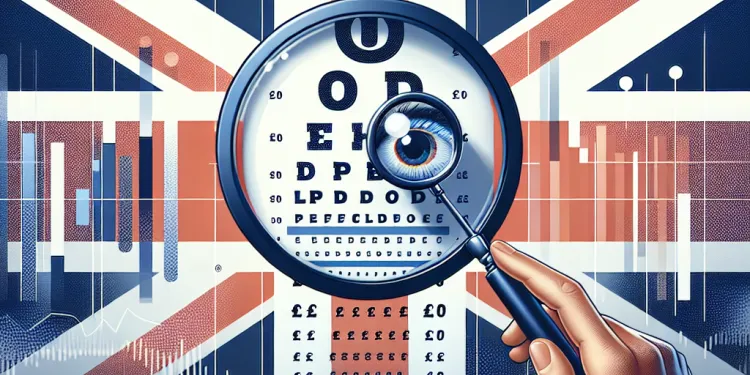
Find Help
More Items From Ergsy search
-

What should I do if I notice changes during self-testing?
Relevance: 100%
-

What is self-testing for eye patients?
Relevance: 86%
-

How often should I self-test my eyes?
Relevance: 83%
-

Should I share the results of my self-tests with my eye doctor?
Relevance: 81%
-

Why would someone need to self-test their eyes?
Relevance: 81%
-

Are self-tests a substitute for professional eye exams?
Relevance: 81%
-

What are the limitations of self-testing for eyes?
Relevance: 80%
-

Can self-testing detect all eye conditions?
Relevance: 80%
-

Is it possible for self-tests to cause harm?
Relevance: 79%
-

Do I need any special equipment for eye self-testing?
Relevance: 78%
-

Can self-testing help me track my prescription changes?
Relevance: 75%
-

Do insurance plans cover the cost of self-testing tools?
Relevance: 75%
-

How do I use a vision chart for self-testing?
Relevance: 73%
-

What age groups can benefit from self-testing?
Relevance: 73%
-

What types of self-tests are available for eye patients?
Relevance: 72%
-

Can I use a smartphone for self-testing my eyes?
Relevance: 58%
-

Are there any self-tests for eye pressure?
Relevance: 51%
-

How does self testing for eye patients work?
Relevance: 51%
-

Where can I find reliable self-testing tools for my eyes?
Relevance: 48%
-

Let's Talk Sexual Health - Home Self Testing Kits
Relevance: 42%
-

What maintenance do defibrillators require?
Relevance: 33%
-

What if my circumstances change?
Relevance: 33%
-

Are there changes to the eviction process?
Relevance: 32%
-

Have the rules for changing a child's name in family court changed in 2026?
Relevance: 32%
-

Can I change my NHS dentist?
Relevance: 31%
-

Should I change my passwords regularly?
Relevance: 31%
-

What should I do if my circumstances change?
Relevance: 30%
-

Is UK air quality changing?
Relevance: 30%
-

Are there changes regarding advertising e-cigarettes?
Relevance: 29%
-

Are there further changes expected after 2026?
Relevance: 29%
-

Are climate changes affecting mosquito populations in the UK?
Relevance: 29%
-

How often do wage rates change in the UK?
Relevance: 29%
-

Is there a change in National Insurance rates for 2026?
Relevance: 29%
-

Is the penalty point system subject to change?
Relevance: 29%
-

Are there any changes to the driving license categories?
Relevance: 29%
-

Will changing my password secure my hacked account?
Relevance: 29%
-

Has the EV grant amount changed recently?
Relevance: 29%
-

Has the notice period for eviction changed?
Relevance: 28%
-

Has the process for adoption changed in 2026?
Relevance: 28%
-

Navigating Post-Brexit Family Law Changes
Relevance: 28%
Introduction to Self-Testing
Self-testing is an important practice for maintaining personal health. It allows individuals to detect potential health issues early, facilitating prompt medical attention. Whether you are testing for COVID-19, monitoring blood pressure, or performing a breast or testicular self-exam, being aware of and understanding any changes is crucial.
Step 1: Stay Calm
Discovering unexpected changes during self-testing can be concerning, but it is important to remain calm. Many changes do not necessarily indicate a serious health problem. Taking a moment to breathe and assess the situation can help you proceed effectively.
Step 2: Note Down Details
Document any changes you observe. Include details such as the time and date of the observation, the nature of the change, and any other relevant symptoms. Keeping a record will be helpful when consulting a healthcare professional.
Step 3: Repeat the Test
If applicable, consider repeating the self-test to ensure the change was not a one-time anomaly or error in testing. Use a new testing kit if necessary, and carefully follow the instructions provided to ensure accuracy.
Step 4: Consult with Healthcare Services
If changes persist or you feel uncertain about the findings, it is advisable to consult a healthcare professional. In the UK, you can contact your GP or call NHS 111 for non-urgent advice. They can provide guidance on whether further tests or investigations are necessary and what steps to take next.
Step 5: Follow Medical Advice
Following your consultation, adhere to the advice or treatment plan provided by your healthcare professional. This may include additional testing, lifestyle changes, or monitoring symptoms over a period of time.
Understanding the Limitations
It is important to understand that self-tests have limitations and are not substitutes for professional medical evaluations. While self-testing can provide valuable insights, trained healthcare providers are essential for accurate diagnosis and treatment.
Conclusion
Noticing changes during self-testing can prompt necessary medical attention and ensure peace of mind. By staying calm, documenting observations, and consulting with healthcare professionals, you can take proactive steps in managing your health. Remember, your health is a priority, and professional guidance is invaluable in addressing any concerns.
Introduction to Self-Testing
Self-testing is when you check your own health. It helps you find health problems early. This means you can see a doctor sooner if needed. You might test for things like COVID-19 or check your blood pressure. It is important to notice any changes in your body.
Step 1: Stay Calm
If you see something different during your test, try to stay calm. Many changes are not serious. Take a deep breath. This will help you think clearly.
Step 2: Note Down Details
Write down what you see. Include when you saw it and how it looks. Write down any other things you feel. This will help your doctor understand better.
Step 3: Repeat the Test
If you can, do the test again. This helps to see if the change was a mistake. Use a new test kit and follow the steps carefully.
Step 4: Consult with Healthcare Services
If the change is still there or you feel unsure, talk to a doctor. In the UK, you can call your GP or NHS 111 if it is not urgent. They can tell you what to do next.
Step 5: Follow Medical Advice
Listen to what your doctor says. They might ask you to do more tests or make changes in your daily life. Follow their advice carefully.
Understanding the Limitations
Self-tests are helpful but can't do everything. They don't replace a real doctor. Doctors are important for knowing exactly what's going on with your health.
Conclusion
Finding changes in your tests can be good. It means you can get help if needed. Stay calm, write down details, and talk to a doctor. Your health is very important and doctors can give you the best advice.
Frequently Asked Questions
What is the first step to take if I notice changes during self-testing?
If you notice any changes during self-testing, the first step is to remain calm and make a note of the changes you observe, including any symptoms, timing, and duration.
Who should I contact if I notice significant changes during self-testing?
Contact your healthcare provider as soon as possible to discuss the changes you have observed.
Should I stop self-testing if I notice changes?
Do not stop self-testing without consulting a healthcare professional. They will advise you on whether to continue or modify your testing regimen.
Can I rely on online resources to interpret changes I notice during self-testing?
While online resources can provide general guidance, it is important to consult a healthcare professional for an accurate interpretation of any changes.
How should I document changes observed during self-testing?
Keep a detailed log of any changes, including date, time, symptoms, and any variables that might have influenced the test results.
What safety precautions should be taken if changes are noticed during self-testing?
Follow safety guidelines specific to the test you are performing, and ensure you are using the testing equipment correctly.
Could changes during self-testing indicate a faulty test?
Yes, it's possible. Check the test instructions and expiration date, and consider using a new test or contacting the manufacturer.
Are there common reasons for changes during self-testing that are not cause for concern?
Yes, dietary changes, recent illnesses, or certain medications can temporarily affect self-test results. Always verify with a healthcare professional.
What if I am unsure whether a change during self-testing is significant?
When in doubt, contact a healthcare provider to describe what you have observed for further advice.
What role does regular monitoring play if I notice changes during self-testing?
Regular monitoring can help track trends over time, making it easier to discuss changes with your healthcare provider.
Is it necessary to consult a healthcare provider for minor changes noticed during self-testing?
Yes, even minor changes should be discussed with a healthcare provider to rule out any potential issues.
What personal information should I provide my healthcare provider when discussing changes during self-testing?
Provide details such as your current medication, diet, lifestyle, and any recent illnesses, along with the changes observed.
Can self-testing be influenced by environmental factors?
Yes, environmental conditions such as temperature and humidity can affect the results of some self-tests.
How can I verify if the self-test I am using is giving accurate results?
Consider using a control solution if available, and ensure you are following the manufacturer’s instructions carefully.
Should I consider switching self-test brands if I notice changes?
Consult with your healthcare provider before switching to a different brand to ensure it meets your testing needs.
Are there resources available to help interpret changes in self-testing results?
Yes, many test manufacturers provide customer support or detailed guidance online. However, it’s best to consult with a healthcare professional for interpretation.
What are possible implications of changes noted during self-testing?
Changes could indicate a need for treatment adjustments, but only a healthcare provider can properly interpret what the changes mean for your health.
What role does mental health play when noticing changes during self-testing?
It’s important to manage any anxiety or stress regarding self-testing and seek support if needed while consulting with a healthcare professional.
How quickly should I act if I notice changes in self-testing results?
Act promptly by contacting your healthcare provider to avoid potential health risks and address issues early.
Can lifestyle changes help address issues noticed during self-testing?
Yes, lifestyle changes such as diet, exercise, and stress management can be beneficial, but these should be discussed with a healthcare professional to ensure they are appropriate.
What should I do first if I see changes when I check myself?
If you find something different when you check yourself, here’s what to do:
1. Tell a Trusted Adult: Talk to someone you trust, like a parent or guardian.
2. Use Simple Words: Explain what you found in simple words.
You can also:
- Use picture cards to show what you're feeling or seeing.
- Write it down if that’s easier for you.
Remember, it’s okay to ask for help!
If you see something different when checking yourself, stay calm. Write down what you see. Also, write down if you feel anything different, when it happened, and how long it lasted.
Who should I talk to if I see big changes when I self-test?
If you see big changes when you are testing yourself, talk to a doctor or nurse. They can help you.
You can also ask a friend or family member to help you call the doctor or nurse.
It is good to write down what changes you see. This can help the doctor understand what is happening.
Talk to your doctor or nurse quickly about any changes you see.
What should I do if I see changes when testing myself?
Do not stop testing yourself without talking to a doctor or nurse. They can tell you if you should keep testing or change how you do it.
Can I trust online information to understand changes I see during self-testing?
Here is how to read and understand this question better:
- Use clear, simple words.
- Read the question slowly, one word at a time.
- Ask someone you trust to help if you feel stuck.
- Use text-to-speech tools to hear the question out loud.
- Look at pictures and videos online that explain testing.
Online help can give you some ideas, but it’s really important to talk to a doctor to understand any changes with your health.
How do I write down changes I see when doing my own test?
When you test yourself, watch for things that are different. Write them down. Use a notebook or a computer. Here are some tips:
- Write the date and time of your test.
- Describe what you see. Is it the same or different from before?
- If something is new, write about it.
You can ask someone to help you if you need it. There are apps that can help you write or talk about what you find. Use what makes you comfortable.
Write down everything that changes. Write the date and time. Write what you feel. Write what you did before the test.
What should you do if you see changes during a self-test?
If you see something different or strange when you check yourself, stay calm. Here’s what you can do:
- Tell a trusted adult what you found.
- Make an appointment with a doctor to talk about it.
- Write down what you noticed and when you noticed it.
Get help if you feel worried. You can use a calendar or phone app to keep track of any changes. Remember, it’s always okay to ask for help or more information.
Make sure you follow safety rules for the test you are doing. Use the testing tools the right way.
Can changes in your self-test mean the test is broken?
Yes, you can do this. Look at the test instructions and check when the test goes out of date. You might want to use a new test or call the company that made it.
Are there normal reasons why things change when you test yourself that are okay?
Yes, what you eat, getting sick, or taking medicine can change your test results for a short time. It's important to talk to a doctor to make sure.
What should I do if I don't know if a change is big during self-testing?
If you are not sure if a change is big, you can:
- Ask someone you trust for help.
- Use a notebook to write down changes. Look for patterns.
- Use pictures or videos to compare before and after.
- Take your time. It is okay to think carefully.
If you are not sure, talk to a doctor or nurse. Tell them what you have seen and ask them what you should do next.
Why is it important to check often if I see changes when I test myself?
Watching your health often can show patterns. This helps you talk to your doctor about changes.
Should I talk to a doctor if I see small changes in my self-test?
Yes, even small changes should be talked about with a doctor to make sure everything is okay.
What should I tell my doctor when I do a test at home?
When you do a health test at home, tell your doctor:
- Your full name and date of birth.
- If you feel different or have new symptoms.
- If you take any medicine or if you stopped taking any.
- If you have been sick or had any health changes.
Ask someone you trust to help if it is hard to remember these things.
Tell the doctor what medicine you take, what food you eat, how you live, and if you've been sick lately. Also, say what has changed with your health.
Can things around you change how self-testing works?
Yes, the weather, like how hot or wet it is, can change what happens when you do some tests by yourself.
How do I check if my test is working properly?
Try using a special liquid, called a control solution, if you have it. Make sure to follow the maker’s instructions very carefully.
Should I change my self-test brand if I see changes?
If you see something different with your test, think about trying a new one. Here are some tips: - Look for other brands to see what people say about them. - Ask someone you trust for advice. - Check if the new brand is easy for you to use. Try different things until you find the right test for you.Talk to your doctor before changing to a different brand. This is to make sure it works for your health needs.
Can I get help to understand my self-test results better?
If you need help to know what your self-test results mean, there are ways to get it.
Here are some things that can help you:
- Ask a grown-up or a friend you trust to help you read the results.
- Look for a simple guide that explains each result.
- Use a mobile app that reads the results to you.
These tools can make it easier to understand what your test tells you.
Yes, lots of test makers have people who can help you. They also have information online. But it's a good idea to talk to a doctor or nurse to understand your test results.
What happens if you notice changes when testing yourself?
If you see changes when you test yourself, here are some things to think about:
- You might feel worried or scared. It's okay to have these feelings.
- Talk to a grown-up you trust about what you noticed.
- You can write down what you see to remember.
- If you're not sure, it's a good idea to ask for help.
- Sometimes, changes can mean you need to visit a doctor.
Tools that can help:
- A checklist to track changes.
- Picture charts to help understand what changes to look for.
- Apps that remind you to test yourself.
Changes in your health might mean you need different treatment. Only a doctor or nurse can tell you what these changes really mean for your health.
How does how we feel and think affect what we notice when checking ourselves?
It's important to take care of any worry or stress about self-testing. Ask for help if you need it and talk to a doctor.
What should I do if my test results change?
If you see a change in your test results, tell someone you trust. Do this quickly. It could be a doctor, a nurse, or a family member. They can help you understand what to do next. You can also use tools like a phone to call a healthcare professional for advice.
Call your doctor right away if something is wrong. This can help you stay safe and healthy.
Can changing my daily habits help with problems I find in self-tests?
Yes, changing what you eat, moving your body more, and finding ways to relax can help you feel better. But it's important to talk to a doctor or nurse first to make sure these changes are right for you.
Useful Links
This website offers general information and is not a substitute for professional advice.
Always seek guidance from qualified professionals.
If you have any medical concerns or need urgent help, contact a healthcare professional or emergency services immediately.
Some of this content was generated with AI assistance. We’ve done our best to keep it accurate, helpful, and human-friendly.
- Ergsy carfully checks the information in the videos we provide here.
- Videos shown by Youtube after a video has completed, have NOT been reviewed by ERGSY.
- To view, click the arrow in centre of video.
- Most of the videos you find here will have subtitles and/or closed captions available.
- You may need to turn these on, and choose your preferred language.
- Go to the video you'd like to watch.
- If closed captions (CC) are available, settings will be visible on the bottom right of the video player.
- To turn on Captions, click settings .
- To turn off Captions, click settings again.
More Items From Ergsy search
-

What should I do if I notice changes during self-testing?
Relevance: 100%
-

What is self-testing for eye patients?
Relevance: 86%
-

How often should I self-test my eyes?
Relevance: 83%
-

Should I share the results of my self-tests with my eye doctor?
Relevance: 81%
-

Why would someone need to self-test their eyes?
Relevance: 81%
-

Are self-tests a substitute for professional eye exams?
Relevance: 81%
-

What are the limitations of self-testing for eyes?
Relevance: 80%
-

Can self-testing detect all eye conditions?
Relevance: 80%
-

Is it possible for self-tests to cause harm?
Relevance: 79%
-

Do I need any special equipment for eye self-testing?
Relevance: 78%
-

Can self-testing help me track my prescription changes?
Relevance: 75%
-

Do insurance plans cover the cost of self-testing tools?
Relevance: 75%
-

How do I use a vision chart for self-testing?
Relevance: 73%
-

What age groups can benefit from self-testing?
Relevance: 73%
-

What types of self-tests are available for eye patients?
Relevance: 72%
-

Can I use a smartphone for self-testing my eyes?
Relevance: 58%
-

Are there any self-tests for eye pressure?
Relevance: 51%
-

How does self testing for eye patients work?
Relevance: 51%
-

Where can I find reliable self-testing tools for my eyes?
Relevance: 48%
-

Let's Talk Sexual Health - Home Self Testing Kits
Relevance: 42%
-

What maintenance do defibrillators require?
Relevance: 33%
-

What if my circumstances change?
Relevance: 33%
-

Are there changes to the eviction process?
Relevance: 32%
-

Have the rules for changing a child's name in family court changed in 2026?
Relevance: 32%
-

Can I change my NHS dentist?
Relevance: 31%
-

Should I change my passwords regularly?
Relevance: 31%
-

What should I do if my circumstances change?
Relevance: 30%
-

Is UK air quality changing?
Relevance: 30%
-

Are there changes regarding advertising e-cigarettes?
Relevance: 29%
-

Are there further changes expected after 2026?
Relevance: 29%
-

Are climate changes affecting mosquito populations in the UK?
Relevance: 29%
-

How often do wage rates change in the UK?
Relevance: 29%
-

Is there a change in National Insurance rates for 2026?
Relevance: 29%
-

Is the penalty point system subject to change?
Relevance: 29%
-

Are there any changes to the driving license categories?
Relevance: 29%
-

Will changing my password secure my hacked account?
Relevance: 29%
-

Has the EV grant amount changed recently?
Relevance: 29%
-

Has the notice period for eviction changed?
Relevance: 28%
-

Has the process for adoption changed in 2026?
Relevance: 28%
-

Navigating Post-Brexit Family Law Changes
Relevance: 28%


